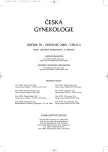Differences in the Polychlorinated Biphenyl Levels in Follicular Fluid in Individual Types of Sterility
Jak se liší hladiny polychlorovaných bifenylů ve folikulární tekutině u jednotlivých typů sterilit?
Cíl práce:
Cílem studie bylo porovnat hladiny polychlorovaných bifenylů (PCB) ve folikulární tekutině u neplodných žen rozdělených podle indikace k zařazení do programu IVF + ET.
Typ studie:
Pilotní studie.
Název a sídlo pracoviště:
Gynekologicko-porodnická klinika 1. LF UK a VFN, Praha, AXYS Varilab s.r.o., Vrané nad Vltavou, Praha, Euromise Centrum, Karlova Univerzita a Akademie věd, Praha.
Metodika:
V pilotní studii bylo vyšetřeno 100 neplodných žen zařazených do programu IVF + ET. Po odběru oocytů byla folikulární tekutina zamražena a předána do laboratoře. Následně byly stanoveny hladiny PCB. Hladiny PCB byly porovnávány u jednotlivých skupin neplodných žen (anovulace, tubární faktor, idiopatická sterilita, endometrióza). Kontrolní skupinu tvořily ženy, kde příčina neplodnosti je na straně muže.
Výsledky:
U pacientek s endometriózou byla zvýšena koncentrace PCB 114, 153, 156, 157, 180 a 189 v porovnání s jinými indikacemi i s kontrolní skupinou. Hladiny bifenylů byly stanoveny v ng na gram tuku navážky.
Závěr:
Zvýšená hladina PCB 114, 153, 156, 157, 180, 189 u pacientek s endometriózou může být jedním z mnoha faktorů podílejících se na vzniku tohoto onemocnění.
Klíčová slova:
IVF + ET, polychlorované bifenyly, endometrióza, xenobiotika
Authors:
Simona Jirsová 1
; J. Mašata 1; P. Drbohlav 1; J. Pavelková 1; L. Jech 2; M. Omelka 3; J. Zvárová 3
Authors‘ workplace:
Gynekologicko-porodnická klinika 1. LF UK a VFN, Praha, přednosta prof. MUDr. A. Martan, DrSc.
1; AXYS Varilab, s. r. o., Vrané nad Vltavou, vedoucí laboratoře RNDr. L. Jech, CSc.
2; Euromise Centrum, Univerzita Karlova a Akademie věd ČR, Praha, ředitel prof. RNDr. J. Zvárová, DrSc.
3
Published in:
Ceska Gynekol 2005; 70(4): 262-268
Category:
Original Article
Overview
Objective:
To find the differences of polychlorinated biphenyls (PCBs) levels in follicular fluid in different indications to treatment with IVF + ET program.
Design:
Pilot study.
Setting:
Department of Obstetrics and Gynecology, 1st Faculty of Medicine, Charles University and General Faculty Hospital, Prague, AXYS Varilab, s.r.o., Vrané nad Vltavou, Prague, Euromise Centrum, Charles University and Academy of Art, Prague.
Methods:
We examinated 100 infertile women undergoing IVF + ET program in our pilot study. After ovarian pick-up, frozen follicular fluid were transported to the laboratory. We detected the levels of polychlorinated biphenyls in follicular fluid of infertile women. The levels were compared according to the different indications of treatment. The control group consist of patients with male factor of sterility.
Results:
We confirmed the higher levels of PCB 114, 153, 156, 157, 180 and 189 in indication endometriosis compared with the others and with control group. The levels of PCBs were in ng/gram of fat.
Conclusion:
It has become apparent that higher levels of PCB 114, 153, 156, 157, 180 and 189 in endometriosis patients may be one of many factors participating in the origin of the disease.
Key words:
IVF + ET program, polychlorinated biphenyls, endometriosis, xenobiotics
Labels
Paediatric gynaecology Gynaecology and obstetrics Reproduction medicineArticle was published in
Czech Gynaecology

2005 Issue 4
-
All articles in this issue
- Sentinel Lymphatic Node Biopsy for Breast Cancer In Practice
- The Detection of p16 Protein in Uterine Cervix Lesions
- Genetic Aspects of Malignant Epithelial Ovarian Tumours
- Prenatal Parvovirus B19 Infection in Fetus
- Pregnancy Complications after Intrauterine Hysteroscopic Surgery
- Threatening Uterine Rupture in Pregnancy after Previous Laparoscopic Myoma Enucleation. Case Report
- Influence of Serum Levels of Luteinizing Hormone during Controlled Ovarian Hyperstimulation on the Results of IVF Cycle
- Prevalence of Thrombophilia in Patients with Severe Ovarian Hyperstimulation Syndrome
- Factors Influencing Success Rate of FISH in Pre-implantation Genetic Diagnostics
- Differences in the Polychlorinated Biphenyl Levels in Follicular Fluid in Individual Types of Sterility
- Results of Transcervical Surgical Therapy on Endometrium Polyps
- Changes in Vesicalization of Urethra and Bladder after TVT Operation
- What Ultrasound Parameter is Optimal in the Examination of Position and Mobility of Urethrovesical Junction?
- TNF-α Serum Levels in Women with Endometriosis: Prospective Clinical Study
- Antibiotics prophylaxis in laparoscopy
- Czech Gynaecology
- Journal archive
- Current issue
- About the journal
Most read in this issue
- Prenatal Parvovirus B19 Infection in Fetus
- The Detection of p16 Protein in Uterine Cervix Lesions
- Changes in Vesicalization of Urethra and Bladder after TVT Operation
- Antibiotics prophylaxis in laparoscopy
